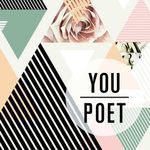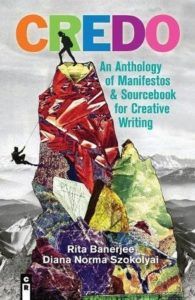Here are two more books on craft that can get that pen to paper. And fingers to the keyboard. And thumbs to the phone screen. And voice to the mic.
You/Poet by Rayna Hutchison and Samuel Blake
This book’s subtitle reads “Learn The Art. Speak Your Truth. Share Your Voice.” That’s empowerment right on the cover. Part I offers really short chapters packed with the basics of traditional poetry and contemporary poetry. There’s also a section on spoken word. Even if you don’t want to read the entire chapters (which, seriously, are so quick!), green info boxes appear with fun quotes and facts about poets. Part II gives a roundup of technique. In addition to discussing metaphors and similes, it gives helpful hints about using semi-colons and colons. (I am in love with this section.) Moreover, there are hints about editing. (I am more in love.) Part III is all about the prompts. Single-word prompts. Word jumble prompts. Image prompts. Micro-poetry prompts (they give you a line and you finish it). Thematic prompts. These prompts appear on lined pages. That means you write right there! Directly following are some easy-to-understand examples of specific poetry forms. Including Twitterature. It’s a thing, y’all.
via GIPHY Part IV is all about getting your work out into the realm of readers. There’s some solid traditional advice, but also included is advice about super-digital-media publishing and publicity. Leading by example, the book has its own hashtag: #YouPoetBook. While it obviously is directed at poets, any kind of writer can get something out of this collection of motivational prompts.
CREDO: An Anthology of Manifestos and Sourcebook for Creative Writing by Rita Banerjee and Diana Norma Szokolyai
While You/Poet focuses on the compact, quick prompting, CREDO offers a more in-depth swell of writing craft. I mean, it’s a man i fest o. For writers who want motivation by way of the profound, this anthology offers philosophical essays about writing. These essays address why we write and how we write creatively. The philosophy behind building the craft appears as a way to urge writers to hone their own skills. For writers who are looking to be inspired by the creative writing of others, there are literary snippets. Read a poem by Camille Rankine. Read some prose by Caitlin Johnson. Then write your own poetry and prose. For writers who want a more pragmatic approach, creative writing exercises also appear. These are prompts in various genres available to any writer looking to write in any way.
via GIPHY From the decades of The Artists’ Way, writers have seen themselves as creators. Both You/Poet and CREDO urge writers to continue to create through writing. Once you’ve found a spark with these, try some more from this list here. As always, feel free to share your experiences with these books or leave your own suggestions in the comments.

